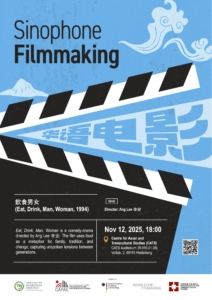
Screening and discussion of “飲食男女 (Eat, Drink, Man, Woman, 1994)”. Eat, Drink, Man, Woman is a comedy-drama directed by Ang Lee 李安. The film uses food as a metaphor for family, tradition, and change, capturing unspoken tensions between generations.
Lifeworlds on two sides of the Taiwan Straits—Cinematic narratives
In a cooperation between the Taiwan Studies Program, the Worldmaking Project and the Center for Asian and Transcultural Studies (CATS), we are offering a series of films this semester from Taiwan, and the People’s Republic of China, depicting complex and conflicted sinophone realities and illustrating different ways of worldmaking, as
—prescribed in the form of “main melodies” by the powers that be, on one side of the Taiwan Straits: we unravel grandiose political narratives of revolution and revival, between dystopia and utopia.
—described as reflections of the everyday, on the other side of the Taiwan Straits: we are given glimpses of “cotidian lives” among the petty, the poor, the marginalized, uncovering their function as heterotopia.
As these films depict multiple “worlds within worlds”, from the point of view of those above, those below and those in between—from gangster boss, to ardent believer, from the young boy playing truant, to an old housewife, dressed to kill, they draw our attention to different types of subjectivities, vulnerabilities, desires and aspirations as effects of everchanging biopolitics in the sinophone world.
Film Schedule
12.11., 6pm, TW 飲食男女 (Eat, Drink, Man, Woman, 1994) , 123 mins.
Venue: CATS Auditorium
Eat, Drink, Man, Woman is a comedy-drama directed by Ang Lee 李安. The film uses food as a metaphor for family, tradition, and change, capturing unspoken tensions between generations.
19.11., 5:15pm, PRC 建党伟业 (Beginning of a Great Revival / The Founding of a Party, 2011), 140 mins.
Venue: CATS Auditorium
Directed by Huang Jianxin et. al., this film shows how China, marked by political disunity embarks on a new rode lead by a handful of individuals, including Mao Zedong, Li Dazhao and Zhou Enlai, who, following the 1911 Revolution, envision a unified nation, and found a Party.
26.11., 6pm, TW 老狐狸 (Old Fox, 2023) 112 mins.
Venue: CATS Auditorium
Directed by Hsiao Ya-Chuan蕭雅全 and produced by Hou Hsiao-hsien侯孝賢, this award-winning film is a family drama about an 11-year-old boy who befriends his landlord and learns from him how to survive in a rapidly changing world (and many things his own poor father would never be able to teach him).
3.12., 5:15pm, PRC 1921 (2021) 137 mins.
Venue: CATS Auditorium
Another retelling of founding a party, directed by Huang Jianxin whose aim it is here, to depict the spiritual world of Chinese Communists in the founding days of the party, their aspirations and their passions.
10.12., 5:15pm. TW 海角七號 (Cape No. 7, 2008) 129 mins.
Venue: CATS Auditorium
Cape No. 7 is a romantic comedy-drama directed by Wei Te-Sheng 魏德聖 and explores cross-cultural connections and life in a small town. Upon its 2008 release, the film became a cultural phenomenon, breaking domestic box-office records and sparking renewed interest in local cinema.
17.12., 6pm, TW 少年吔,安啦!(Dust of Angels! 1992) 106 mins.
Venue: CATS Auditorium
Directed by Hsu Hsiao-ming 徐小明 and produced by Hou Hsiao-hsien 侯孝賢 the film is a landmark Taiwanese gangster film, it captures the restlessness of youth against the backdrop of Taiwan’s rapid modernization and the growing divide between rural and urban life.
7.1.26, 6pm, PRC Chairman Buddha (2016), 71mins.
Venue: CATS Auditorium
Chairman Buddha is a documentary directed by Tang Louyi. It follows those who believe that Mao Zedong has been reincarnated as a Buddha.
14.1., 6pm, PRC 现成品 (ReadyMade, 2009), 78 mins.
Venue: CATS Auditorium
Mao Zedong died in 1976, but his impersonators are alive and well. This film documents the lives of two people who resemble Mao and assume Mao roles. Peng Tian is a villager from Mao’s home province of Hunan who walks into the Beijing Film Academy one day in full Mao dress to study film acting. Chen Yan is a housewife from Sichuan province, whose mother realized she looked like Mao. The documentary was directed by Zhang Bingjian.




